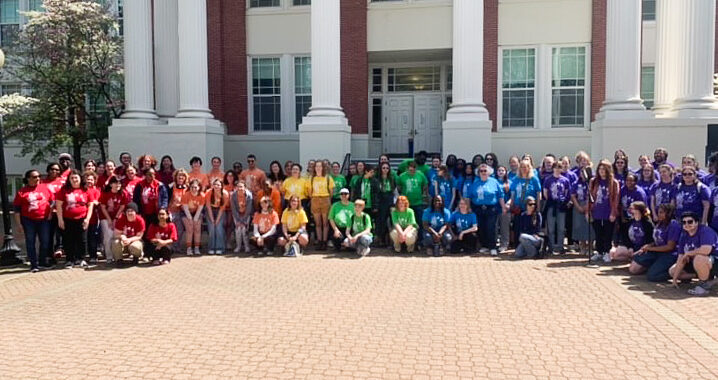FOIA fees are cost-prohibitive to student journalism
6 min read
FOIA requests cost students large amounts for information | unsplash
by KATE SELTZER
Former Editor-in-Chief
In the fall of 2018, then-sophomore Alicen Hackney had a bug problem. Hundreds of water beetles had taken up residence in the walls of her apartment in Eagle Landing, a problem which would take the school about seven weeks to solve. According to Hackney, it wasn’t until about six weeks into the process that she and her roommates were informed that the bugs were part of a building-wide issue.
Hackney, a former writer and editor at The Blue & Gray Press who graduated in 2020, decided she wanted more information about why students weren’t told about the extent of the bug problem and who knew what when. So, in April of 2019, she filed the following Freedom of Information Act (FOIA) request:
“All pest and plumbing related work orders (work orders and proceeding maintenance forms) from Eagle Landing in the Fall 2018 semester, all emails regarding pest and plumbing issues in Eagle Landing between maintenance staff and the Eagle Landing Area Coordinator, RAs and SRAs in the Fall 2018 semester.”
The response was that the maintenance requests were available, but they would cost her upwards of $7,000.
“I couldn’t move forward with my story,” she said. “No one can afford that. My story got lost.”
The first part of her request, “pest and plumbing related work orders (work orders and proceeding maintenance forms) from Eagle Landing in the Fall 2018 semester,” generated 42 pest work orders and 50 plumbing work orders. Producing these records, according to the then-FOIA officer Marty Morrison, would have required 7.5 hours of work by managerial staff who made $28 an hour, and making copies of 92 pages, for a total of $219.20.
The second part of the request, “all emails regarding pest and plumbing issues between maintenance staff and the Eagle Landing Area Coordinator, RAs and SRAs in the Fall 2018 semester,” would require 74 hours of work between 25 staff members who made between $16 and $42 an hour. Those fees, plus copies of 1,200 pages, worked out to $7,356. The total for Hackney’s request came out to $7,575.
Though Hackney asked for advice from the Student Press Law Center, there didn’t seem to be much of anything anyone could do, even with rewording the request to be narrower.
“It came down to ‘is this important enough for us to move forward with?’, and it just wasn’t.”
Since Hackney’s original request, The Blue & Gray Press filed the same request, with the same wording, in September of 2019. That request came back as costing $717.00. The same request, but with the dates changed to the fall of 2020, filed in March of 2021, came back as costing $1,755 – still out of reach for accessing that information, but significantly lower than the initial estimate. In the case of the spring 2021 FOIA request, the cost of Vice President of University Relations Anna Billingsley’s time processing the request was waived, as was the cost of the time taken to generate the estimate.
“We appear to have gotten cheaper,” said Billingsley, who also serves as the FOIA officer at UMW. “[Between 2019 and 2021], a new system [for work orders], Schooldude, was implemented, meaning far less reliance on emails. It’s the email recovery that is so expensive and time-consuming.”
The new system accounts for the disparity between the 2019 and most recent FOIA requests, but it does not explain the difference between $7,000 and $700 between April and September of 2019.
“I will say that there are different people involved every year – on the FOIA side and the gathering-of-information side,” Billingsley said. “Sometimes, higher paid personnel need to be tapped.” FOIA requests are handled on a case-by-case basis. “When a cost is involved, we always say it’s our best estimate – could be higher, could be lower. Personnel on hand at the time makes a big difference, as does the volume of work involved. I believe we generally come down on the conservative side in regard to costs.”
Neither Billingsley nor anyone at Facilities, the department in charge of processing the request, could conclusively identify the reason for the discrepancy, in part because of the high degree of personnel turnover in recent years.
“In the past, Facilities has used management, [who made] $42 an hour and a professional [who made] $28 an hour to handle all FOIAs,” Billingsley said. “In recent years, as a means of reducing costs for FOIA requests, Facilities started using clerical staff [who make] $16 an hour to do more of the work.”
Accounting for that change, with all else being equal, the second FOIA request with the exact same language as the first should have cost $5,401.20 – a vastly different number from the $717 fee.
Hackney is one of many student journalists who face high fees to access records, even though their programs lack the funds to support such requests.
Ginny Bixby, a former writer and editor for The Blue & Gray Press, filed a FOIA request in the spring of 2019 for records pertaining to Resident Assistant retention from 2016 to 2019. The breakdown of her cost to fill that request was 23 hours of work completed by someone who made $28 an hour, for a total of $644.
“Frankly, I was extremely demoralized when I found out how much they wanted to charge me for this FOIA,” Bixby said. “There was absolutely no way that the Blue & Gray could’ve afforded that FOIA, let alone me affording it myself. I remember feeling like ResLife was trying to keep information from me, which I thought was odd, because I was confused why they wouldn’t want the chance to provide their statistics and their perspective.”
Bixby also made the point that all students, not just student journalists, are affected by high FOIA costs.
“What if a student who was planning to apply to an RA position wanted to view public records about RA retention prior to making their decision?” she said. “This is public information and should be public. The cost barrier hinders students, who ResLife and other university offices are well aware can not afford to spend hundreds of dollars on FOIAs. I understand that there is a level of cost for the work to do these, but the rates they give are astronomical and do not make sense.”
Though public institutions like UMW are required to make certain records available to the public, they often come at a cost. The Virginia FOIA Act mandates that the people of the Commonwealth have “ready access to public records in the custody of a public body or its officers and employees, and free entry to meetings of public bodies wherein the business of the people is being conducted.”
However, under the law, public bodies can charge fees for producing records. Fees must be “reasonable” and cannot exceed the actual cost of producing public records. For student journalists in particular, even reasonable costs – which are often at least several hundred dollars – can be out of reach. This is also true at other schools.
The University of Virginia’s campus newspaper, The Cavalier Daily, has also had to drop stories as a result of exorbitant FOIA fees. In recent months, they were nearly unable to report on how Greek life organizations were permitted to hold bid days in the pandemic, leading to a spike in COVID cases in the community, because the FOIA fees would have been unattainable. Luckily for them, a community member filed a similar request and passed along the information for free.
Meanwhile, the College of William and Mary waives the cost of FOIA fees for student journalists.
“William and Mary allows free FOIA requests for all student publications up to a certain amount of hours required to access the requested information,” said Emma Ford, an editor at the college’s newspaper The Flat Hat. “I believe it is 11 hours or a certain dollar amount, but we have never been close and therefore, have never had to pay for a FOIA.”
Though that waiver of fees has proven useful for reporters at The Flat Hat, it’s not a practice the Virginia Coalition for Open Government, an organization with expert knowledge of Virginia FOIA law, generally endorses.
“In general we have not at [the VCOG] supported fee waivers because it gives the power to governments to make the decision on whose FOIA request is more worthy than others,” said Megan Rhyne, executive director. “While we certainly hope fees will be reasonable and low, we hope that for everyone, not just for one type of requester or another.”
Though there’s not presently a remedy for high – and inconsistent – FOIA costs, Rhyne says that may change in the future.
“There was a resolution passed this General Assembly session that directs the FOIA council, in conjunction with us and other stakeholders, to spend a year looking at FOIA fees and how and if the statute can be amended to deal with some of these runaway costs and problems with fees.”











